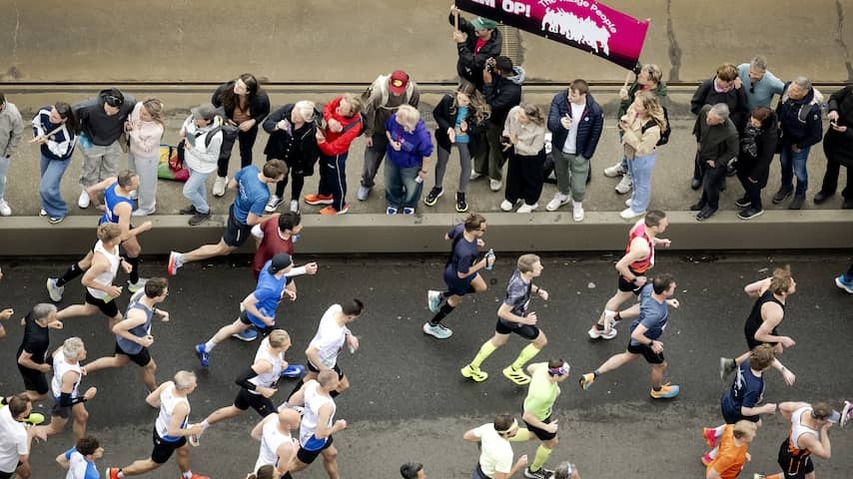
Maybe you, Like Thousands of Others, Participated in Spring Marathons in Rotterdam, Enschede, Or Zeeuws-Vlaanderen Last Weekend. After months of training, the goal you’ve legs working Towards Suddenly Disappears. But what now? How and when do you set a new goal?
Running a Marathon is physically demanding. It’s an assault on your body, say sports physician kasper janssen and thijs eijsvogels, exercise physiologist and associate professor at Radboudumc. “It’s an event where you push your personal limits with a significant distance. Most people try to achieve a good time for themelves,” Says Eijsvogels. “You see that a body is QUITE BATTERED Afterwards.”
The fact that a marathon is an assault on your body can be seen in your feet, joints, muscles, and blood vessels, among other things. “If you measure afterwards, you see all sorts of changes,” Says Eijsvogels. “For example, the function of the heart is somewhat less after a sporting event than it was before the start. A child of fatigue of the heart.”
And if you look at the Blood After the Fact, Accordance to the Exercise Physiologist, You See Aldum Increases In Signaling Substances That Indicate Muscle Damage 24 to 48 Hours After A Marathon.
But this reduced heart function and muscle damage do not mean that running a marathon leads to health problems. Accordance to Eijsvogels, it remains within what the body can handle, and the function of the heart recovers within one to two days. The Muscle Damage is also part of the training process. Your muscles recover when you rest. “The Idea is that you come out stronger and can then handle sub -signal challenges better.”
‘Take It Easy’
How quickly you recover from a marathon DEPENDS on how much you have trained, Say Both Eijsvogels and Janssen. Accordance to Eijsvogels, Most People Recover Within A Week. Janssen Says That You Recover Within Three Weeks.
“Recovery Depends on how much experience you have and how hard you have run,” Says Janssen. “Competitive runners Recover Faster. And if you have delivered an exceptional performance, you will have to recover longer.” It also defends on how well you sleep, your diet, and how stressful your job. If you have sustained an injury, the recovery can take much longer.
Take it easy the week after the marathon, advises Eijsvogels. Keep Moving in Daily Life by Taking the stairs or cycling to work, but wait a while with intensive training. “See How Your Body Recovers And Whether You Can Resume Training in The Course Of The Week.” You Will Notice That Your Body Has Not Yet Recovered If You Still Have Muscle And Joint Pain And Are Tired.
It also helps to do a different sport for a while after the marathon. “Such as swimming,” Janssen Gives as an Example. “That is low-intensity. You load your muscles in a different way than with running. That is good for your body.”
Make Sure You Recover Mentally AS Well
You also need to recover mentally after a marathon. “A Mental Dip After Running A Marathon is very Logical,” Says Sports Psychologist Thijs Rentier. Rentier is Thinking, For Example, or Athletes Who Are Working Towards The Olympic Games and Whose Goal Suddenly Disappears After Months of Preparation. This is also the case after running a marathon. “Your Routine Disappears and that Doesn’t Always Feel Good. People like Control and Structure.”
The Biggest Pitfall is that People Immediately Start Thinking in Solutions and Setting New Goals, Rentier Sees. “But they pay less attention to the fact that it is logical that you feel this way.” You don’t have to ignore that feeling. Instead of immediately chosing new goals, you can reflect on what you have achieved. “You have probable made good progress,” Says Rentier. “Also look back at the time you ran or how you approached the process. That’s the motivation for a next goal.”
Also Celebrate Your Performance, Rentier Advisen. Maybe you had to stick to a training schedule strictly and now you have time to do something with friends or choose another sport. “Taking some mental distance is also good for your recovery. It remains personal: people who love running pick it up again quickly. But of course there are also people for whom the marathon was an ultimate goal and think: what now?”
How to find a new goal
Was the marathon your ultimate goal and are you looking for a new goal? “Then Ask Yourself Why You Wanted to Run The Marathon And Why It was on your Bucket List,” Says Rentier. “Where did you get the challenge from? If you have ticked that off, you can look for another challenge that fits within those values.”
There are people who, in Addition to a Spring Marathon, would also like to run an autumn marathon, Eijsvogels Knows. Accordance to Janssen, that is Possible if you are fit, in good condition and have had sufficient recovery time. Would you prefer a narrower goal? Then a 10 kilometer racing can be a goal.
“If you have recovered well after a marathon, you can run 10 kilometers after four week – Without much training,” Says Janssen. “Because you were so fit for the marathon and had trained for it, you have already done that training. Your muscles have recovered, but your lungs, heart and blood vessels are still fit. You will stop the benefits of that.”
Janssen also gives tips for other goals, such as short distances in The Summer, The Zevenheuvelenloop or Hyrox. The Latter is a Combination of Running and Strength Exercises. A Hill Run is Another Challenge and Hyrox Provides Variety, Janssen Explains. A Marathon Abroad can also be a challenge. “Make sure you have time to live up to it. Take the time to prepare and enjoy it.”